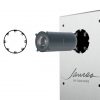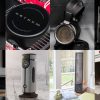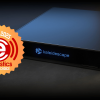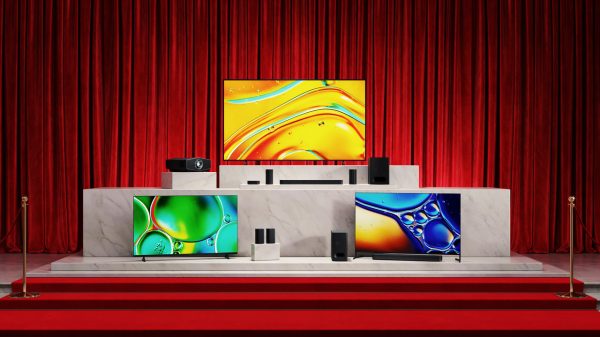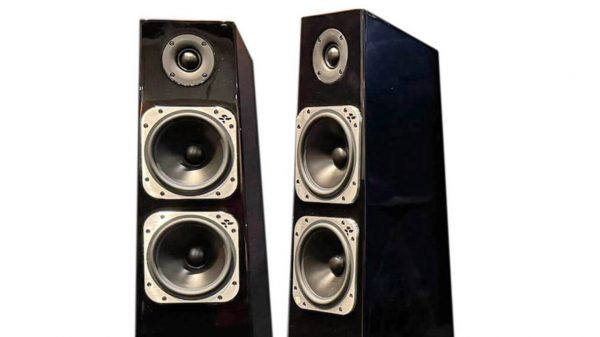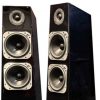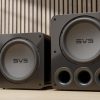Creative recently sent us two pairs of their new Aurvana IEMs, the ACE and ACE 2 which are being marketed as the first TWS earbuds that support Bluetooth LE Audio, lossless audio, and feature xMEMs tweeters. The fine print is that the ACE utilizes aptX Adaptive; one will have to pony up an additional $20 for the ACE 2 that supports aptX Lossless. They promise a lot for $129 and $149 and we were very curious to see if they would be competitive below $150 USD.
We don’t usually review 2 products at the same time, but these should be viewed as the same product with slightly different features. The battery, industrial design, and sonic presentation are the same; only slight colorway differences and support for different Bluetooth codecs differentiate them.

Unboxing
Both arrive boxed with the buds, case, charging cable, three sets of tips, and the manual. The case for the ACE is matte black whilst the ACE 2 sports a transparent gray exterior with copper internals that show through.
The case is roughly 2.5 inches wide, 1.5 inches tall, and 0.5 inches thick with rounded corners so it fits well in a pocket and proved to be rather comfortable.
One immediate pet peeve is the cases will not stand and charge at the same time because the USB Type-C port is on the bottom of the case along with the reset button.
The buds are of the stick style variety with a bulb on the top and a roughly 1 inch stem. The ACE is black and the ACE 2 are offered in transparent gray with some internals visible at top.

The nozzles exit the front most part of the bulb so the earpiece sits behind the ear canal with the tip used to seal it. This is important to note as I found my ear was somewhere between mid and large sized (by the tip dimensions) and a third-party tip gave better performance than either of the provided options.
Internally, both use a 10mm dynamic driver to handle bass and the midrange, while an xMEMs driver handles the upper ranges. xMEMs or Extreme Micro Electro Mechanical Systems, use processes very similar to semi-conductor chips and create an incredible precise array of miniature drivers using a silicon membrane.
Silicon is both lighter and stiffer than titanium, beryllium, or DLC resulting in an extremely fast response time and when combined with a direct piezo electric drive, are more efficient than other technologies.
This results in either hyper efficient drivers capable of producing sound with much less power over conventional drivers; with most of the emphasis being to bring better audio to hearing aids and miniature devices, the focus has been on smaller, lighter, and more efficient drivers.

xMEMS drivers can be full-range from 20Hz-20kHz, but in this case Creative is using them to their best advantage which is high-frequency sound reproduction where the silicon membrane’s extremely high resonance frequency allows for cleaner sound than nearly all competing technologies.
Most think of solid state devices as meaning “no moving parts” but in this case it should be thought of as tiny, very precise components with incredibly tight tolerances, both between elements on the same driver and between drivers.
Wireless Technology
In addition to the new xMEMS technology, the ACE offer Bluetooth LE which offers the promise of lossless audio. In addition, the ACE offers aptX Adaptive, whilst the ACE 2 offers aptX Lossless for those whose devices are not Bluetooth LE ready. The bad news is that there are not many devices that support Bluetooth LE or aptX Lossless. Currently, no Samsung, Apple, or Google device supports aptX Lossless over Bluetooth.
Some will point to the upcoming Pixel 8 Pro patch, but read the fine print — it’s for USB only. In order for a device to support the aptX Lossless encoder, it has to utilise the Snapdragon 8xx chipset and currently none of the big 3 have updated to that standard leaving tens of millions of users in a position where the best they can expect is aptX Adaptive.
The good news is that the Aurvana ACE 2 will fall back to aptX Adaptive so purchasing it is safe for now and a hedge for later when chipsets catch up. AptX Lossless is available today on some Sony, Asus/ROG, Vivo, Motorola, and Nubia phones so I set out to find a phone I could use to test with.
Nubia was kind enough to supply a RedMagic 9 Pro for a few weeks to try out. Nice phone, but not compatible with my carrier so it was my DAP (digital audio player) for a couple weeks which was fine for the purpose of testing the ACE models.
I also tested with an iPhone 14 and OnePlus 11 to get a full measure of what to expect on the most commonly available phones on the market when using the wireless earbuds.

Listening Notes
The ACE models both support ambient modes and ANC with slight differences between the two. The ACE has what Creative labels as “hybrid ANC” whilst the ACE 2 is listed as Qualcomm adaptive ANC. I found the signature did change depending on mode with the ANC bringing more and less defined bass response.
Those looking for big bass may initially like the ANC option but after listening for some time it becomes evident that the bass texture is being reduced by engaging ANC and it is a better option to disable ANC and use one of the 15 EQ presets or customize your own to augment the desired frequencies.
The default tuning is a ‘V’ with emphasis on the 50-100Hz range at the low end and the 3kHz-5kHz range in the treble.
There is also a bit of an 8kHz peak that makes itself known at times.
Those looking for a more neutral presentation will find cutting lower frequencies (20, 50, 60Hz) by -3dB in the EQ app will bring the sub bass a bit closer to neutral and indeed cleans up a lot of the boom evidenced in the default signature.
On the top end, a reduction of -3dB on the 4.6kHz band helps to bring balance as well.
With the cuts in place, both earbuds deliver a rather solid degree of bass impact and enough detail to keep things interesting. These do not deliver the detail retrieval of the top models in the category, but they do compete well at their price point and have a more engaging sound than many.
They should also make a good gym earbud thanks to their IPX5 water proofing and strong pacing.
The one issue others may find is tip selection is critical to keeping them seated well and none of the provided tips were a great fit for my ears. When excercising, they tended to shift and break seal which caused some odd audio effects at times.
Spin-fits cured the issue so if oddities in the signature appear during exercise be aware that breaking the seal on the tips may be the cause.
The tuning is clearly aimed at popular genres. Mids are solid with good guitar growl and with ample levels of detail if not quite top of the class. Strings can suffer a bit as they lack the energy unless some generous EQ is used. However, a third-party parametric EQ like that in UAPP provided fine tuning options that the EQ in the Creative app lacked.

Highs are nice which is really what I had hoped to listen to the Aces for as the xMEMS drivers have been highly touted. They don’t disappoint with good speed, clarity, and detail. I found percussion had good snap with cymbals sounding quite lifelike and enough sparkle at the top to give a nice open top-end.
In fact, some of the boom in the bass is highlighted by the fact that the upper lift is so much cleaner. The dynamic driver can’t match the speed of the xMEMS at the top end. At times, that can be heard as the top end has moved on to the next note while the dynamic driver is still in decay from the previous. This is on display with tracks that are fast and complex with the various genres of metal providing good examples. Kick drum is slower than the screaming vocals or wailing guitars at times.
It wasn’t noticeable on slower tracks, but with with more energetic tracks comes an opportunity for the xMEMS to show off.
The xMEMs drivers have a lot of potential as a tweeter, because they didn’t display the plasticity of sound that often comes with balanced armatures. They are also more energy efficient than piezo or electret technologies that are often used to try and expand the headroom at the top end of the range.
Soundstage reproduction is good, but it is a closed back in-ear bud so users shouldn’t expect a lot of depth and width. What is there, is well proportioned with enough height to allow movements to travel around the stage in seemingly natural patterns. Imaging is aided by the speed at the top which helps separate higher voices but deeper voices lag a bit due to the speed dichotomy.
Noise Cancelling

The upside is that noise cancelling does help reduce outside noise and when music isn’t playing there is no hiss or hum as is common with a lot of ANC in-ears models.
However, the ANC does impact the signature and the overall performance of the ANC is only average. This is very likely partially due to the physical design as the buds simply do little to block the ear canal and rely on the tips to handle most of the passive isolation duties.
This can be easily demonstrated by removing the tips and seating the buds in the ears normally without them. Doing so results in almost no decrease in external sound.
Call Quality
Both ACE models have Qualcomm’s cVc noise reduction for phone calls and sport 6 microphones to pick up voices and isolate them from background noise. In my testing, it worked well with call recipients having no issues separating my voice from various background noises.
Although vocal quality was noted as being only average. During a few conference calls, I was told clarity was not quite as good as meeting attendees have reported to me in the past.
Keep in mind, the Audeze FILTER Speakerphone has become my benchmark on the desktop at work for meetings and the ACE were competing against something designed specifically for this scenario.
Missing Features & Issues
A couple things became apparent during my testing that I had assumed early on. First, neither ACE has on-head detection so taking them off and placing them on the desk will result in the earbuds continuing to play music. So don’t expect to put the buds back in ear and have them pick-up where you left off. We looked through the app and there was no ability to change that.
Also at times, There was a pattern of taking the buds out of the charging case and the app indicated that only the right earbud was connected to the phone. This was only on Android devices, but did happen with multiple phones of different brands so was not limited to a sole device.
Returning the buds to the case and then removing both again cured whatever ailed it, but I did have the issue often enough to feel it was worth at least mentioning as others may see the same behavior.
Battery Life
In my testing the buds do get at or just over the 6 hours Creative promises but only with ANC off and the volume at moderate levels. Turn ANC on and the usable time drops to about 4.5 hours which is a bit below the bar in today’s market.
The case adds another 3 charges before needing to be plugged in via the USB Type-C port or recharged using wireless charging, which both support.
The earbuds also support quick charge so a 10 minute charge will net another hour of use (again with ANC off). This is good performance at this price point, but still behind the category leaders.

Final Thoughts
The Creative ACE offer a lot to like with a few limitations that potential buyers should be cognizant of. The sound is well matched to today’s most popular genres of music and the xMEMS tweeters do deliver a clearer and more defined top end than a lot of their competitors (at the $149 price point).
The EQ works well and gives listeners a greater range of options for further tuning the sound to their liking. The ANC works well enough but there is still room for improvement here as it pertains to the impact on the sound quality when used.
The addition of aptX Lossless on the ACE 2 helps future proof the purchase as phones grow into the technology. However, the ACE model is not left lacking for clarity with aptX Adaptive compatibility.
Often early to market products with new technology are more of a proof of concept and less viable for daily use. I am happy to report that is not the case here and the two Creative Ace Wireless Earbuds are quite competent whether it be for the gym, office, or daily commute.
The future looks bright (pun intended) for xMEMS, and for Creative’s Aurvana ACE and ACE 2.
If you want good sound and occasionally need ANC, these two models offer a lot of value for the money.
Where to buy:
- Creative Aurvana Ace – $129 at Amazon
- Creative Aurvana Ace 2 – $149 at Amazon
Related Reading:





